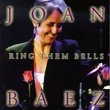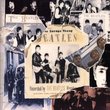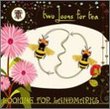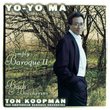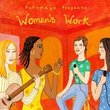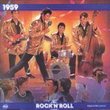| All Artists: Peggy Seeger Title: An Odd Collection Members Wishing: 3 Total Copies: 0 Label: Rounder Release Date: 7/8/2009 Genres: Folk, Pop Styles: Traditional Folk, Contemporary Folk, Singer-Songwriters Number of Discs: 1 SwapaCD Credits: 1 UPCs: 011661403123, 011661403147 |
Search - Peggy Seeger :: An Odd Collection
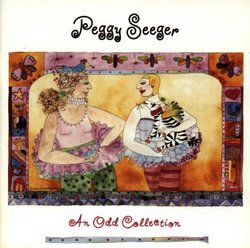 | Peggy Seeger An Odd Collection Genres: Folk, Pop
Peggy Seeger, sister of Pete and Mike and daughter of composer Ruth Crawford and folklorist Charles Seeger, has been singing traditional music for over half-a-century and writing songs for most of her life. In 1959 she set... more » |
Larger Image |
CD DetailsSynopsis
Album Description Peggy Seeger, sister of Pete and Mike and daughter of composer Ruth Crawford and folklorist Charles Seeger, has been singing traditional music for over half-a-century and writing songs for most of her life. In 1959 she settled in England with the Scots singer/writer Ewan MacColl, who celebrated their union by writing "The First Time Ever I Saw Your Face." With 14 solo albums to her credit and countless joint albums, she has spent the last two years drawing together two comprehensive songbooks: The Essential Ewan MacColl Songboook and The Peggy Seeger Songbook, Warts and All. All but four of the songs on An Odd Collection are previously unrecorded and recently written. Similarly Requested CDs
|
CD ReviewsSuperlative political folk music Joe Sixpack -- Slipcue.com | ...in Middle America | 09/09/2002 (5 out of 5 stars) "A great set by Peggy Seeger, whose sprightly sense of humor was always a welcome counterbalance to Ewan MacColl's somewhat dour sensibilities. Here she relaxes and cracks smile after smile, as she makes the case for her leftie world view with numerous deft satirical dabs. This collection is "odd" in that most of the songs hadn't been recorded before; although the handful that had are among her most powerful. The older tunes include "Emily," a haunting song about domestic violence, and "Housewife's Alphabet," another '70s tune that sets the tone for much of the album. The newer songs include labor ballads and elegies to MacColl and other folkie heavyweights, such as Ralph Rinzler, who is remembered in "Lost Friend." Most of the songs have a feminist emphasis, which was Seeger's forte. She really has a knack for making scathing social observations in a gentle, ingratiating manner; it's hard to argue with someone who makes you laugh so hard you start to cry. A pity they couldn't include her classic "I Was Gonna Be An Engineer" on this set, it would have fit right in! All in all, though, this is a great record. If you enjoy political folk music, or just plain good music, intelligently performed, then this disc is definitely recommended." Songs for women, men and a sustainable environment Mr. B. E. Power | Brighton, UK | 08/29/2001 (5 out of 5 stars) "There are some fine songs on this album, which will serve the interests of many campaigns and discussion groups, as well as being enjoyed for their lyrics and melodies on an individual level. As with all Peggy Seeger recordings, the musical arrangement is superb and the listener is treated to a variety of folk instruments in addition to a piano, which Seeger plays like the base strings of a guitar to accompany vocals that show great versatility and technique.
"Wonderful World" (1995), written by Peggy with input from Irene Scott, is a happy vocal (with a deliberately complacent tone) about how we are ripping the world apart in the name of civilization. We are urged to go further until we have no environment left. Today with intensive methods of agriculture no longer sustainable in places that call themselves advanced industrial nations, our wonderful world is coming under closer scrutiny and counties like Holland are promoting new policies for a sustainable future. Brainwashed consumers will resist change, yet Peggy's feminist message in songs like "The Mother" (1986) and the environmental campaigning directly addressed to men in "For a Job" (1992) and "You Men Out There" (1995) should help to remove the confusion. Peggy knows that some men have done their share of campaigning for a better environment. Her brother, Pete Seeger, has been tireless in his campaigns to clean up rivers such as the Hudson (Listen to "Sailing Down This Golden River" and "Garbage" on Pete's album "Circles & Seasons" 1979). Track 3 "Leftwing Wife" (1991) is Peggy's witty tribute to Pete's wife Toshi. Many a good campaigner needs someone to look after the home. Until women took to Greenham Common with their orange survival bags to kit down, leaving the housework to their partners, it was often mainly women who were the invisible power behind protests by men who fronted many successful campaigns. I've yet to find a book by Bertrand Russell providing tips for homemakers! "Sellafield Child" (1989)is a powerful warning against playing with radiation to provide domestic fuel supplies, though the campaigns on this album also address more particular issues. My own favourite track is the humourous "It's a Free World" (1993) where smokers' rights to poison the air in a café are swept aside by farters' rights to do the same! The recording also features Peggy doing on a piano what she used to do on the base strings of her guitar. Diverse women's (and men's) issues are given a good airing in "Everyone Knows" (1994), which humorously describes the more dangerous male equivalent of the 'female menstrual cycle. "Vital Statistics" (1992) explores the IQs of men who relate to women as '38-26-38' bimbos. "Judge's Chair" (1989) is a personal case-study performed as a ballad, which questions the humanity of the Law in making 'abortion on demand' more difficult for women and promoting backstreet clinics where women go in desperation at great risk to their health when the men who have made them pregnant desert them. "Emily" (1977) is sung as an unaccompanied ballad, capturing the bare surroundings of the refuge for battered women and telling the sad story of a happy relationship that turned to increasing violence on the part of Emily's husband. Finally, Emily has to flee her home with her three kids. They are forced to take cover in the refuge - the best protection that society will offer them against one of many violent men who abuse their partners and families. As on most Peggy Seeger albums, there are some intensely personal songs. With characteristic honesty, Peggy is willing to make public some of the most difficult moments in her life. Listeners who have had similar experiences will find comfort in hearing someone owning up to weakness, doubt and uncertainty as well as strong human instinct. Much of the interest in Peggy Seeger's lyrics lies in their openness. She felt quite understandably "Lost" (1989) on the death of her partner of over 30 years (Ewan MacColl). She could not bear to remain in her own home or even in the UK, because everywhere she went reminded her of Ewan. A few months later, she writes a song "Love Unbidden" (1990) where she is still coming to terms with the new love in her life, which she is able to celebrate in "Da Dee Da Da" (1990). In "Old Friend" (1995) written (with support from Irene Scott) to Ralph Rinzler who died in 1994, a special friend who Peggy met when she was a college student in 1954, we have evidence of love and understanding for people because of who they are, and a catchy melody with a lovely autoharp accompaniment and harmony by Peggy's brother Mike Seeger. An equally catchy and happy personal song is "On This Very Day" (1994). The very day in question is 25th March. Peggy Seeger first met Ewan MacColl on 25th March 1956, but the main event celebrated in this song is the marriage of Peggy's second son Calum MacColl to Kerry Harvey-Piper. To make the song of greater interest to a wider audience, Peggy catalogues all the historical events of importance that occurred on 25th March. Neill, Calum and Kitty MacColl are all involved in the intrumental backing (mandolin, guitar) and vocals and Peggy's leading vocal and 5-string banjo contributes to the party atmosphere of this song. Although personal to Peggy, Calum and Kerry, the song is another of my favourite tracks. This album is a very wide ranging collection, but it is one of human understanding rather than "An Odd Collection". Thematically, the album should have particular appeal to those campaigning for women's equality (men included) and for a sustainable environment in which we may celebrate, while showing consideration for other living creatures and the eco-systems that are necessary for life on earth." |

 Track Listings (19) - Disc #1
Track Listings (19) - Disc #1